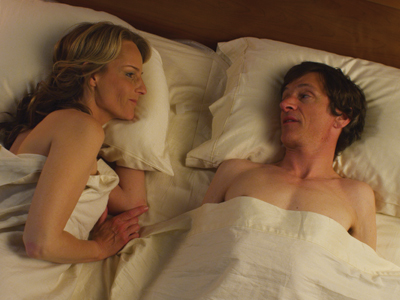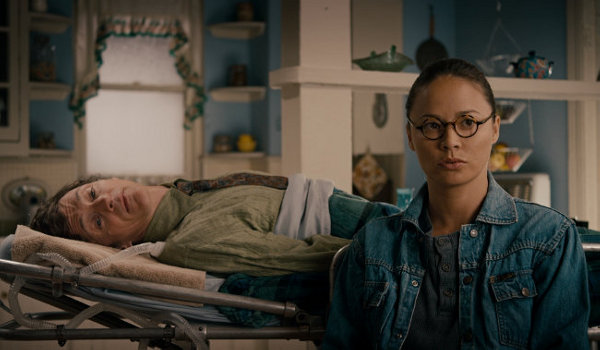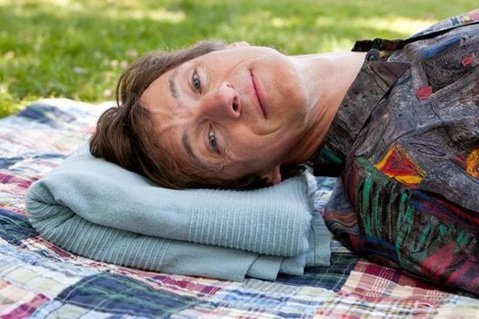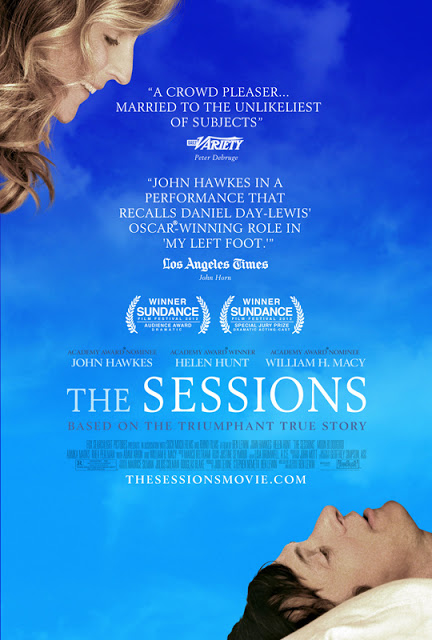 |
| Movie poster for The Sessions |
Written by Stephanie Rogers.
What I’m trying to say is: Helen Hunt is awesome.
Her latest Sundance Film Festival hit is based on an essay Mark O’Brien wrote for The Sun called, “On Seeing a Sex Surrogate,” which chronicles his experience losing his virginity in his late thirties. Hunt plays Cheryl Cohen Greene, the sex surrogate, and Hawkes plays O’Brien, a man who contracted polio at the age of six and became paralyzed except for limited use of muscles in his right foot, neck, and jaw. He couldn’t spend more than a few hours outside of an iron lung (a metal chamber that forces the lungs to inhale and exhale) and, despite that fact, went on to earn a graduate degree in journalism from UC Berkeley—by traveling back and forth between the university and the iron lung at home. With the ability to move only his head, he wrote articles and poems by holding a stick in his mouth and tapping out letters on a computer.
The audience learns all this within the first ten minutes of the film, and that’s about the time I started telling myself to stop going through life like a lazy fuck.
 |
| Helen Hunt as Cheryl Cohen Greene and John Hawkes as Mark O’Brien in The Sessions |
That’s some pretty intense subject matter … not me being a lazy fuck—that’s for my therapist and me to work out SOMEDAY—but the serious exploration of a disabled man’s sexuality. While the focus remains on O’Brien throughout, The Sessions also gives us several comedic moments with other physically disabled characters as O’Brien interviews them for an article he’s writing about the sex lives of the disabled. I can’t tell you how refreshing it was to see an on-screen depiction of people with disabilities who do things like omg have sex and who also enjoy talking candidly and unapologetically about having sex. O’Brien’s reactions are hilarious; he gets fairly embarrassed and weirded out during the interviews, but the stories he hears ultimately empower him to think seriously about his own sex life, or lack thereof.
Enter the inimitable William H. Macy (yes!). He plays O’Brien’s priest, Father Brendan, who listens to O’Brien’s confessions every day while guiding him through the guilt he feels about seeking out a sex surrogate. That relationship soon evolves (once O’Brien begins spending time with the surrogate) into more of a friendship, and it’s wonderful to see those lines blurred; watching Macy go from praying with O’Brien in church for the first half of the film to showing up in sweats with a six-pack at O’Brien’s house in the later half got the whole theater cracking up. That friendship grounds the film and keeps it from veering into sentimental territory; the audience looks forward to their light-hearted conversations about some truly heavy subject matter. At the same time, their friendship adds emotional depth to the characters. We realize it isn’t just O’Brien’s physical disability that complicates his sexual exploration, but his Catholic faith as well. These two immensely likeable men clearly like each other—and their pontifications about the role of religion in their lives, and what God will and won’t forgive—keeps this from turning into yet another film about a dude just trying to get laid.
 |
| William H. Macy as Father Brendan and John Hawkes as Mark O’Brien in The Sessions |
Before seeing the movie, I hadn’t heard about sex surrogates. The real Ms. Greene (who still practices at the age of 68) describes the difference between her profession and prostitution as follows:
If you go to a prostitute, it’s like going to a restaurant. You read the menu, you choose what you want, they prepare, they hope that you love it, and hopefully you want to come back.
With a surrogate, it’s like going to cooking school. You get the ingredients, you learn to make a meal together—and then the point is to go out into the world and share that and not come back.
 |
| Helen Hunt as Cheryl Cohen Greene in The Sessions |
Most reviews I’ve read of The Sessions focus on Hawkes’ ridiculously good performance as O’Brien—after all, his acting essentially comes from nothing more than his voice and facial expressions. Oscar nomination? Probably. But I’d like to focus on the women in the film, particularly Hunt’s portrayal of Cheryl Cohen Greene.
Helen Hunt ultimately brought The Sessions to life for me. She treats O’Brien with such care, both emotionally and physically, while always maintaining a directness with him that undercuts any potential melodrama. One of my favorite scenes in the film happens right after O’Brien’s first, very brief moment of vaginal penetration. Afterward, he asks, “Did you come, too?” to which she responds, “No, Mark, I didn’t.” I fell in love with the film right then; the innocence of his question and the honesty of her response created more intimacy than most faux-passionate, desperation-filled Hollywood sex scenes could ever hope for.
And that’s the thing about Hunt’s performance. Hawkes, while indisputably great, wouldn’t be half as good in this role if he weren’t playing opposite Helen Hunt. She portrays Greene as confident and self-assured, with no lacy-underweared attempts at sexiness, and with only a tinge of sweetness. This isn’t a film about seduction. It’s mechanical and complicated and wonderful—at one point he has to stop performing cunnilingus because he can’t breathe; at another, she goes to the bathroom in front of him with the door open. Though she forges a strong bond with O’Brien emotionally, the goal always lingers: to help him lose his virginity and help him discover new ways to use and appreciate the human body, his own especially. Hunt says as much in an interview with the L.A. Times:
Maybe it all gets blurry near the end for a second … But I think that’s life—you can have some errant arrow prick your heart, but these two characters have an intention to keep to their mandate that this all is supposed to serve him. And both of them stick to that, painful as it is.
 |
| John Hawkes as Mark O’Brien and Moon Bloodgood as Vera in The Sessions |
I’d like to say that all the women in the film were as wonderfully fleshed out and complex as Hunt’s character, but that isn’t true. O’Brien works with three women caretakers throughout, the first (and least conventionally attractive of which) he fires because she just kind of huffs around acting like an asshole. The second is a beautiful woman whose name I can’t remember, and her character development consists mainly of O’Brien gazing longingly over dreamy sequences of her hair blowing in the breeze and shit. Of course he proposes to her (why not!), at which point she quits … but then randomly shows up again later for an impromptu picnic in the park. Okay. The third woman caretaker, well, I kind of loved her. Vera (played by Moon Bloodgood) eases his anxiety more than anything, often making funny quips about sex and the not-a-big-dealness of it as she transports him to and from his sessions with Greene. That affords her an authentic intimacy that the other women characters—other than Greene, of course—don’t get to have. While the previous caretakers exist as shallow plot points to move O’Brien’s story forward, Vera shares a true friendship with him; in many ways, their relationship mirrors the directness and openness of his relationship with Greene.
 |
| John Hawkes as Mark O’Brien in The Sessions |
